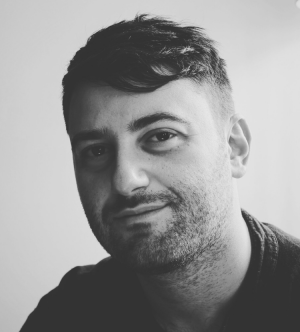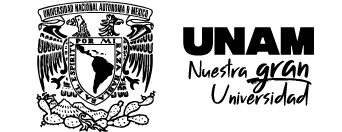Versiones al español de Sara Camhaji
Escalera
I
¿Cómo se rompe
una historia?
No al
desmontarla
(o desarmarla)
sino al
contarla y
volverla a contar
y volverla a contar.
La historia
es un
arco
Es una cuerda
Es una red
sosteniendo el peso
de frutas caídas
de viejos árboles —
y no puede sostenerse.
Despierto en una manta
de sonido y luz
en una ciudad remota donde
la historia de quién posee qué
la historia de quién tomó qué
es contada y recontada
hasta que la historia se quiebra
en el alcance del oído
y la mente se cierra.
Ladder
I
How does
a story break?
Not by
taking it
apart
(or dismantling it)
but by
telling and
retelling
and retelling.
The story
is a
bow
It is a string
It is a net
holding the weight
of fruit fallen
from old trees —
and it cannot hold.
I wake in a blanket
of sound & light
in a remote town where
the story of who owns what
the story of who took what
is told and retold
until the story breaks
on earshot
and the mind closes.
II
Estás
parado/a
en un campo
la tierra
húmeda con
lluvia intensa
que acaba
de pasar
•
Estás
en un tren
Para trabajar
el libro
arrugado
pero aún no
abierto
•
Estás
volando
a casa
frente a
la ventana
•
Estás
cenando
con un/a
viejo/a amigo/a
•
Estás
formando
las palabras
para contar
la misma
historia
y se
rompe
•
En el campo
la historia
vuelve a ti
una estrella: rota-brillante-incoherente-cantando
en un lenguaje
que no puedes identificar
¿acaso está
siquiera en un lenguaje
conocido en algún lugar?
•
Estás
hablando
con un/a
nuevo/a amante
y se rompe
•
Se cae
cae
como una
escalera
arrojada desde una ventana
(de lo que no se puede hablar, hay que callar)
¿Recuerdas
dónde
quedamos
ambos/as
parados/as?
•
Resistes
el soldado
gira
tus brazos
tus palabras
gritas
¿una palabra?
él grita
¿una palabra?
nada construye
la historia se quiebra
•
Tu madre
te cuenta
una historia
Antes de que
puedas entender
su significado
la historia se quiebra
II
You are
standing
in a field
the soil
wet with
heavy rain
that has
just passed
*
You are
on a train
to work
the book
creased
but not yet
opened
*
You are
flying
home
head on
window
*
You are
having
dinner
with an
old friend
*
You are
forming
the words
to tell
the same
story
and it
breaks
*
In the field
the story
returns to you
a star: broken–shining–incoherent–singing
in a language
you can’t identify
if it is
even in a language
known anywhere?
*
You are
talking
to a new
lover
and it breaks
*
It falls
falls
like a
ladder
kicked down
from a window
(whereof one cannot speak thereof one must be silent)
Do you
remember
where we
were both
left
standing?
*
You resist
the soldier
twists
your arms
your words
you yell
a word?
he yells
a word?
nothing builds
the story breaks
*
Your mother
tells you
a story
Before you
can make
out its
meaning
the story
breaks
III
¿En qué punto
de su
narración
una historia—
se quiebra?
¿por dientes, por lengua, por encías, por boca?
los hechos acumulados
se quiebran
las aseguranzas susurradas
se quiebran
la disculpa inclinada hacia abajo
se quiebra
el argumento incisivo
se quiebra
en 1945 los estadounidenses liberan
se quiebra
en 1948 aterrizamos
se quiebra
la historia comenzó en
Estambul
se quiebra
la historia comenzó en
Salónica
se quiebra
Auschwitz
se quiebra
Córdoba
se quiebra
Gaza
se quiebra
Jerusalén
se quiebra
III
At what point
in its
telling
does a story—
break?
by teeth, by tongue, by gum, by mouth?
the accumulated facts
break
the whispered assurances
break
the down-bending apology
breaks
the incisive argument
breaks
in 1945 the Americans liberate
breaks
in 1948 we landed
breaks
the story began in
Istanbul
breaks
the story began in
Thessaloniki
breaks
Auschwitz
breaks
Córdoba
breaks
Gaza
breaks
Jerusalem
breaks
IV
Cuando se quiebra
el silencio
el miedo / la vergüenza
los celos / la angustia
la mentira no se dobla
la mentira se fractura, ya no es maleable
se quiebra
estamos aquí porque
se quiebra
ellos se comportan así porque
se quiebra
ellos provocan incendios
se quiebra
nuestro destino es
se quiebra
merecemos este lugar
se quiebra
así es como uno sobrevive
se quiebra
así es como aprendimos a sobrevivir
se quiebra
por eso nos odian
se quiebra
esto es sólo su cultura
se quiebra
cuando la historia que te contaron
se vuelve frágil
y se quiebra / barak / se quiebra / bracha
se quiebra
IV
When it breaks
silence
fear / embarrassment
jealousy / anguish
the lie bends not
the lie fractures, is no longer pliant
breaks
we are here because
breaks
they behave this way because
breaks
they set fires
breaks
our destiny is to
breaks
we deserve this place
breaks
this is how one survives
breaks
this is how we learned to survive
breaks
this is why they hate us
breaks
this is just their culture
breaks
when the story you were told
becomes brittle
& breaks / barak / breaks / bracha
breaks

Autor
Tom Haviv
/ Escritor y artista multimedia nacido en Israel, aunque vive actualmente en Brooklyn, Nueva York. Su primer libro de poesía, A Flag of No Nation, fue publicado en 2019. Además, es autor de dos libros para niños: Woven (2018) y The Porcupine Prince (2023).



